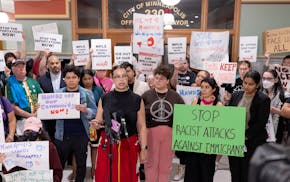U.S. workers with disabilities would no longer be paid a subminimum wage under a rule the Biden administration proposed this week, an outcome some Minnesota advocates have sought for years as the state continues to have among the highest numbers of the low-paid workers.
It remains to be seen whether the incoming Trump administration will follow through on the change.
The nearly 90-year-old system has allowed employers to pay workers, like Jenny Svihel of Sauk Rapids, cents on the dollar. Svihel, who has a learning disability and is hard of hearing, used to get less than minimum wage. She said she earned as little as $1.65 every two weeks cleaning hotel rooms.
She now works in the deli at a Coborn's Grocery Store, making full wages. When she got her first check from a full-paying job, she said, tears ran down her face.
"We want to be happy, we want to have a better future, a better life. We want to go out in the community. We want to succeed. We want to grow and learn," said Svihel, who has pushed state leaders to make the change in Minnesota. "Put yourself in our shoes — how would you feel if you got this money?"
Roughly 37,000 people nationwide and 3,481 Minnesotans with disabilities are paid subminimum wages. Only Missouri has more people paid at that level, according to U.S. Department of Labor data from last month.
If the Labor Department's proposed rule is enacted, it would immediately stop issuing any new certificates that allow employers to pay less to people with disabilities. Minnesota's minimum wage is $10.85 an hour for large employers and $8.85 for small ones, and a number of cities have higher minimums. Over the following three years, organizations that already had the certificates would have to phase out the practice.
"One of the guiding principles of the American workplace is that a hard day's work deserves a fair day's pay, and this proposal ensures that principle includes workers with disabilities," Labor Department Wage and Hour Administrator Jessica Looman said in a statement.
In Minnesota, disability rights advocates have argued against the system that allows employers to pay workers with disabilities based on productivity. Many states have already eliminated the subminimum wage, but efforts to follow suit have failed at the Minnesota Capitol.
Even without a mandated change, some Minnesota employers have been shifting away from the practice in recent years.
Meanwhile, parents of some adults with more severe disabilities staunchly oppose the move and have asked lawmakers to keep the subminimum wage. Larry and Liz Alexander, who live near Hampton, are among those wary of the Biden administration proposal.
Their 34-year-old daughter, Anne, has autism and is largely nonverbal. After high school, Anne started doing subminimum wage work. She occasionally made $300 or $400 every two weeks doing "piecework," such as assembling items for Menards, which her mom said she was good at and provided an outlet for nervous energy. A year and a half ago, the subminimum wage work she participated in stopped.
"She was actually filling a very real need in society. But now she can't work for any less than minimum wage and there's no way she can function at a level to make minimum wage," Liz Alexander said.
Her daughter feels the loss of no longer doing a "real job" and instead spends hours at classes through her day program. Participants engage in music, yoga, coloring and crafts, Alexander said, but "you can only do so much of that a day."
"We have very, very good friends [with disabilities] who do work for minimum wage ... or better. And they should get minimum wage because they are doing every bit the job anybody else in that position would," she said, but when it takes four workers to do the job that one worker would do it's "unrealistic" to pay them all a full wage.
Minnesota Senate Human Services Committee Chairman John Hoffman, DFL-Champlin, said he hasn't read the proposed federal rule, but questioned whether it will ensure people have transportation and other support they need to be successful in jobs.
"You can't just throw dates out on the table" to end the program, Hoffman said. "There are parents who are scared. 'What's the system going to do to support my child going forward?'"
Society has changed since the Fair Labor Standards Act regulating subminimum wages passed in 1938, and "we don't need to pay people less anymore," countered Larissa Beck, senior director of program services at the nonprofit Reach for Resources. The group offers employment support, case management and other services for people with disabilities.
If the federal government enacts the proposed rule, she said, the state is ready to make the change. Beck was a member of the Minnesota Task Force on Eliminating Subminimum Wages that sent legislators a plan last year for how to phase out the low pay.
Lawmakers did not approve the wage change.
However, in recent years the state has devoted millions of dollars to help employers transition to more inclusive workplaces, train case managers for people with disabilities and support people in competitive jobs.
Beck and several other local advocates said they plan to keep pushing state legislators to end subminimum wages while they wait to see what happens with the Biden administration's proposed rule.
The Minnesota Department of Human Services is closely monitoring the federal proposal, Assistant Commissioner Natasha Merz said in a statement. She noted the state has made "significant strides" to prepare for the change.
"Our efforts are aligned with the federal goal to eliminate subminimum wages, and we have invested in initiatives that create meaningful, competitive employment opportunities for people with disabilities," Merz said.
The timing of the Labor Department's announcement this week surprised some Minnesotans, though the federal agency has been reviewing the program that allows for subminimum wages since last year.
The department is taking comments on the proposed rule through Jan. 17 and Naveh Eldar, CEO of The Arc Minnesota, said the organization is mobilizing people to share their thoughts. The rule could be revised based on feedback and it needs to make it through a number of bureaucratic steps under the Trump administration before it could become reality.
"Politicians want to make the voters happy," said Eldar, whose organization advocates for people with intellectual and developmental disabilities. "If we can have an avalanche of support around this hopefully the next administration will see that this isn't a partisan issue, it's a human rights issue, and they will support it."
Staff writer James Walsh contributed to this report.

Minneapolis City Council lowers street food cart license fee, hoping fruit sellers will hawk legally

How the federal raid unified the fractious Minneapolis City Council against Trump, sort of
Trump travel ban 'cruel,' Minnesota advocacy group says

No verdict after first day of jury deliberation in Derrick Thompson murder trial for crash that killed 5

